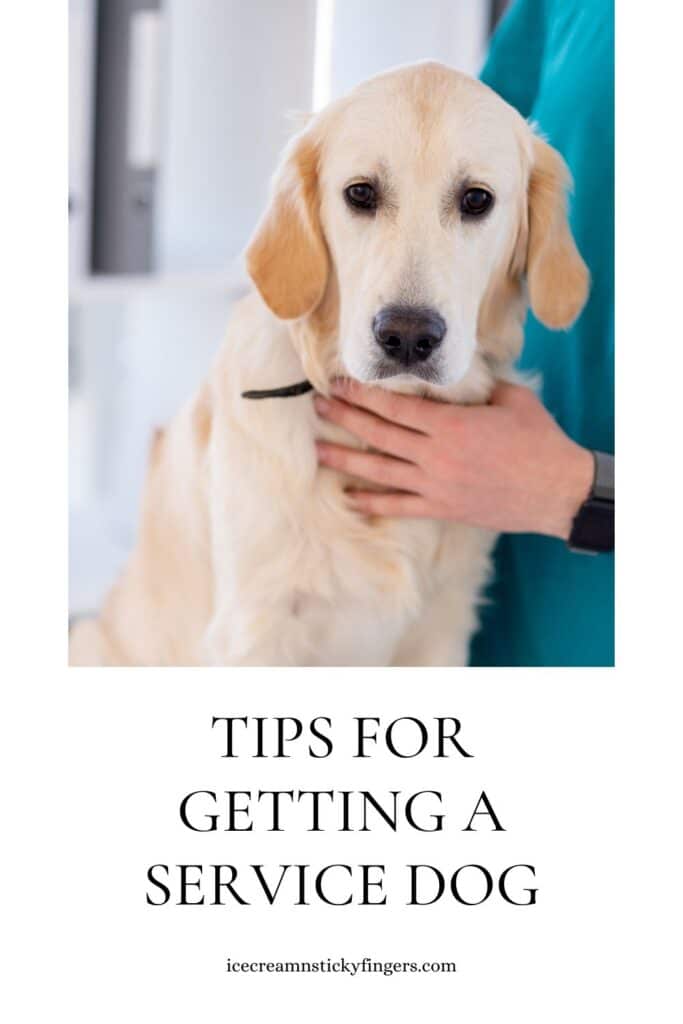What are some tips for getting a service dog? Getting a service dog can be a life-changing decision for individuals with disabilities or specific needs. Here are some tips to help you navigate the process of obtaining a service dog:

Understand Your Needs
Determine the specific tasks or services you require from a service dog. Whether it’s for mobility assistance, medical alert, psychiatric support, or any other purpose, clearly define what you need the dog to do for you.
Research Organizations
Look for reputable organizations that train and provide service dogs. Ensure they have experience in training dogs for your specific needs. Consider factors such as the organization’s reputation, training methods, success rate, and cost.
Research the Laws
Familiarize yourself with the laws regarding service dogs in your country or region. These laws may vary, but generally, service dogs are allowed in public places and are granted specific protections under disability rights laws.
Consider Your Lifestyle
Owning a service dog is a significant commitment. Consider your living situation, daily routine, and ability to care for and exercise the dog properly.
Choose the Right Organization or Trainer
If you’re looking for a professionally trained service dog, research and select a reputable organization or trainer that specializes in training service dogs for your specific disability or condition. Look for reviews, success stories, and their certification or accreditation.

Assess Eligibility
Each organization may have its own criteria for eligibility. Typically, you need to have a disability or specific needs that can be mitigated by a service dog. Some organizations may also require a medical professional’s recommendation or documentation.
Meet the Eligibility Criteria
Service dog organizations have specific eligibility criteria for applicants. You may need to provide medical documentation, demonstrate your need for a service dog, and show that you can care for and handle the dog responsibly.
Plan for Costs
Obtaining and maintaining a service dog can be expensive. Consider the costs of acquiring the dog, training, veterinary care, food, grooming, equipment, and ongoing care. Look into financial assistance options such as grants, scholarships, or fundraising.
Apply and Wait
Organizations often have an application process, which may include an interview, an assessment of your needs, and possibly a waiting period. Be prepared for a potentially lengthy process, as there is often high demand for service dogs.
Training and Matching
If your application is approved, you may be placed on a waiting list for a suitable dog. Once a dog is available, you’ll typically need to undergo training with the dog to learn how to handle and work with them effectively. Training can range from a few days to several weeks or months.
Bonding and Adjustment
After the training period, you’ll begin the process of bonding and adjusting to living with your service dog. This involves building trust, reinforcing commands, and integrating them into your daily routines.
Socialization
Proper socialization is crucial for service dogs to adapt to different environments and situations. Expose your service dog to various places, people, and experiences to build their confidence and adaptability.
Legal Rights and Responsibilities
Familiarize yourself with the laws and regulations regarding service dogs in your country or region. Understand your rights as a handler and the responsibilities that come with having a service dog in public spaces.
Handler Training
Service dog handlers need to be trained on how to work effectively with their service dogs. Participate in handler training programs offered by the organization or seek training from qualified professionals.
Ongoing Care and Training
Service dogs require regular care, grooming, exercise, and continued training. Stay committed to maintaining the dog’s well-being, health, and skills. Be prepared for occasional challenges and setbacks during the training and adjustment period.
Support and Community
Connect with other service dog handlers, support groups, or online communities to share experiences, advice, and resources. They can provide valuable insights and support throughout your journey with a service dog.
Remember, the process of obtaining a service dog can take time and effort, but the benefits of having a well-trained companion to assist you with your specific needs can be immensely rewarding.








🐶🐕🦺 Your tips for getting a service dog are invaluable for those who need these wonderful companions. 🌟🤝 It’s a life-changing journey, and your insights make it more accessible. Thanks for sharing this important information! 🙌🐾😊
I know service dogs are so beneficial for some people. I hope anyone who needs one can get one. Fabulous tips!
Getting a service dog is a big decision. I don’t know that I would know where to begin. It is good to have a guide.
This article is a must-read for anyone in need of a service dog. Some great tips also for family members who are helping someone in getting one.
These are really useful tips! I know someone who is on a waiting list for a service dog. There is a shortage in my area right now.
Research and patience are definitely two big ones here. I’ve had a few service dogs and can attest that these steps are very accurate.
Such great advice! My friend is planning to get a professionally trained service dog for his father. I’ll share these tips with him.
I particularly appreciate the emphasis on understanding one’s needs and researching reputable organizations.
These are great tips for anyone looking for a service dog! I’ve had golden retrievers for the last 15 years, but not as service dogs. Thanks for sharing this!
I really like the tips you have provided here and I think they are very helpful. I want to get a service dog soon.